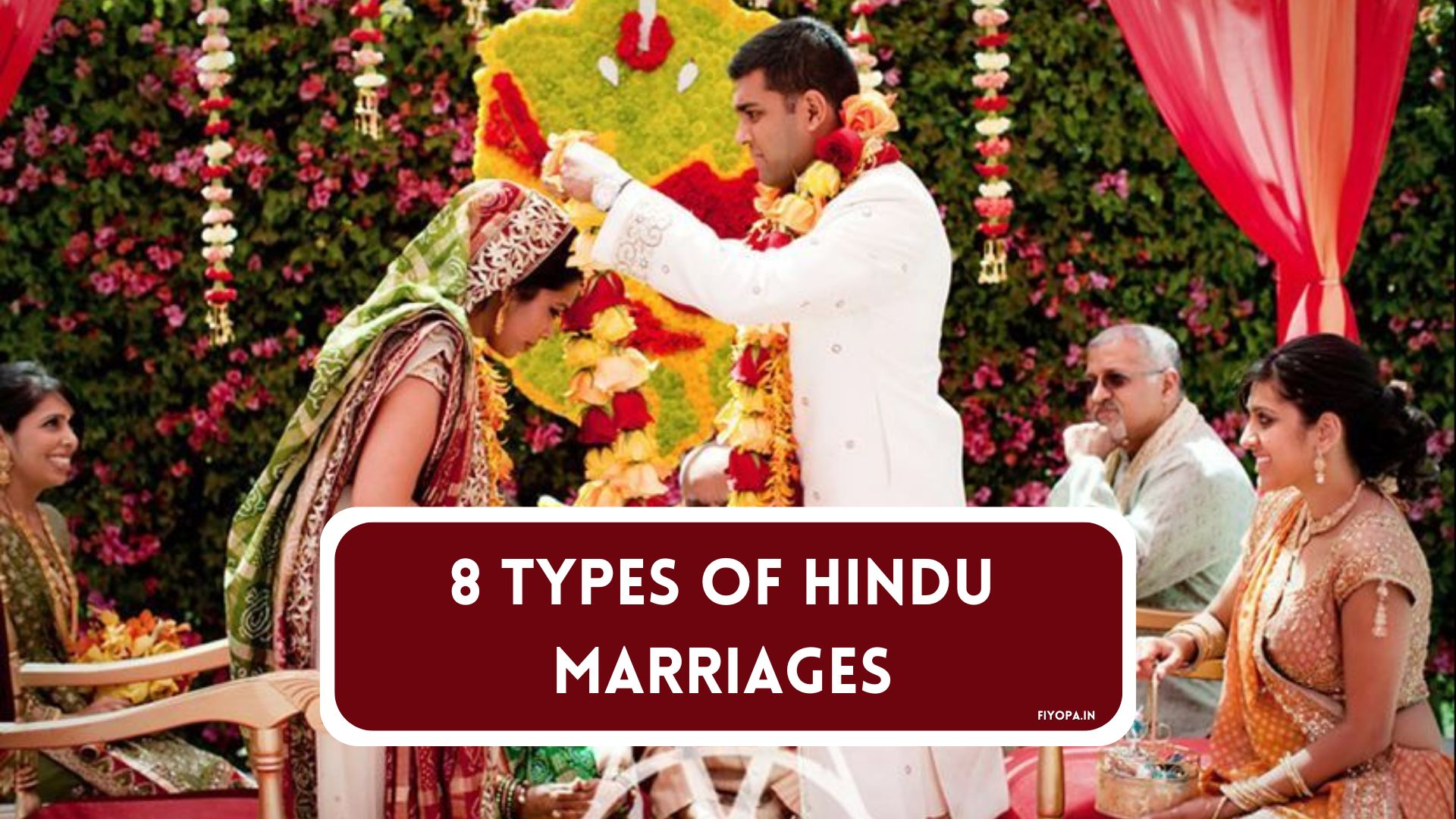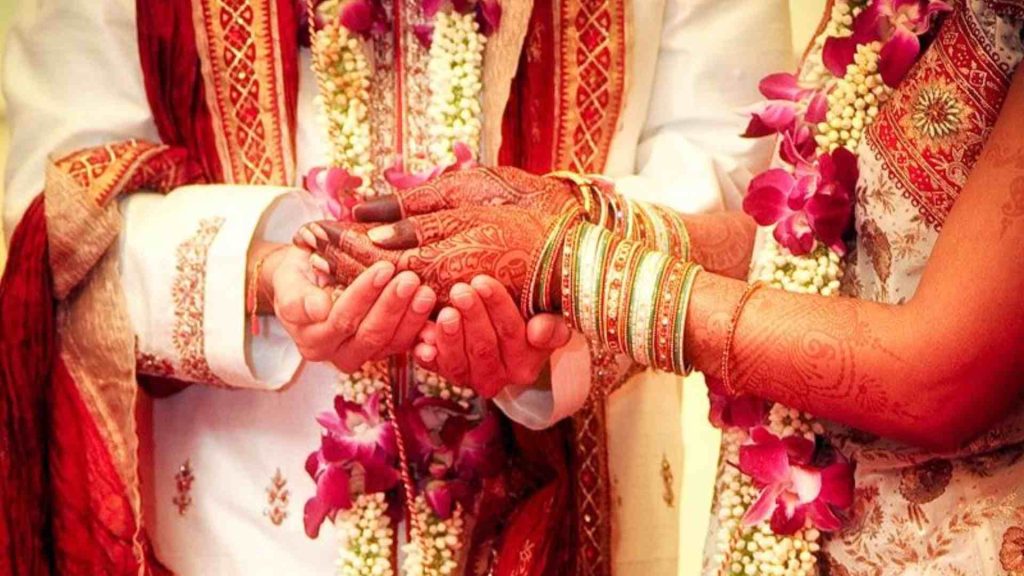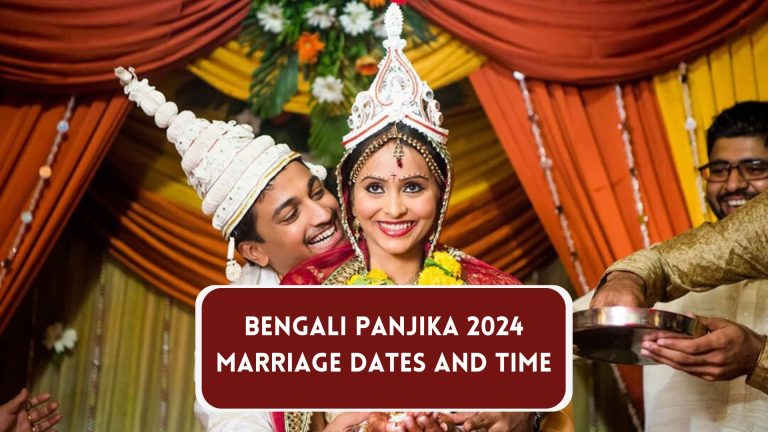Types of Hindu Marriages: concept of marriage in Hinduism

Types of Hindu Marriages! Wedding in Hinduism is known as “Vivaha” and is very crucial and is among the main “Samskaras” (rites of passing). In contrast to Western religions, Hinduism sees marriage as an oblation between two souls that endures after the end of this world. It has roots in social, religious, and philosophical beliefs and forms the basis of the Hindu social system. It helps people fulfill their obligations to their dharma (duty) as well as the artha (wealth) and kama (desires) and, in the end, moksha (spiritual liberation).
Eight Types of Hindu Marriages

The earliest Hindu laws and scriptures called “Dharmashastras,” outline eight types of marriage, highlighting the various traditions and social customs of the time. The marriage types were mostly based on the nature of the alliances between families, as well as the rules of ceremonies and rituals.
| Type of Marriage | Brief Description |
| Brahma Vivaha | Considered the best form of marriage, it occurs when a girl’s father gives her away to the groom after ensuring that he is of good character and learning. The groom doesn’t offer any materialistic compensation to the bride’s family. |
| Prajapatya Vivaha | Similar to Brahma Vivaha, this marriage involves the bride’s father giving her away to the groom, but with the mutual understanding that the couple would fulfill their Dharma together. |
| Arsha Vivaha | In this form of marriage, the groom gives a cow and a bull to the bride’s family before the wedding. This form was prevalent among the sages or Rishis. |
| Daiva Vivaha | This type of marriage involves the bride’s father giving her away to a priest as a sacrificial fee. This type was practiced when the parents couldn’t afford the expenses of their daughter’s marriage. |
| Asura Vivaha | In this form of marriage, the groom pays a dowry to the bride’s family to marry her. It’s considered a lower form of marriage as it’s essentially a bride being bought by the groom. |
| Gandharva Vivaha | This is essentially a love marriage where the couple marries without the consent of their parents. It’s based on mutual attraction with no rituals, witnesses, or dowry. |
| Rakshasa Vivaha | This is a forced marriage where the bride is abducted and forced to marry against her will, often after the defeat of her family members in battle. It’s considered a brutal form of marriage. |
| Paishacha Vivaha | Considered the lowest form of marriage, it involves the man seducing or deceiving the woman into marriage when she is not in a sound state of mind. This form is condemned by the scriptures. |
These are 8 Types of Hindu Marriages

Brahma Vivaha:
Brahma Vivaha is considered to be the most beautiful type of marriage in Hindu tradition. In this wedding, the bride’s father is looking for an appropriate groom. The groom’s knowledge of Vedas and moral character and the capacity to be a trustworthy husband are crucial. After being chosen, the bride is presented to the groom and the ceremony is based on Vedic rituals. This kind of wedding is mostly followed in the Brahmin caste which is the reason it is referred to as “Brahma Vivaha”.
Prajapatya Vivaha:
Prajapatya Vivaha is like Brahma Vivaha by its respectable nature. In this ceremony, the father of the bride gives her to the groom after singing a holy mantra to ensure their wellbeing. Similar to Brahma Vivaha, the groom’s character and knowledge are essential. However, the principal objective of Prajapatya Vivaha will be to perform the obligation of having children to preserve social order.
Arsha Vivaha:
Arsha Vivaha was named in honor of Sages or ‘Rishis. In this wedding, the groom presents things, mostly cows to the parents of the bride. It is viewed as an expression of gratitude and not as the equivalent of a donation to a dowry. The groom can be a sage or a person who is interested in Vedic studies, focusing on an easy life, not material wealth.
Daiva Vivaha:
Daiva Vivaha involves making the bride the priest in a ritual sacrifice to symbolize her wedding to the gods. This kind of wedding usually is the case when parents can’t find an appropriate groom or can’t afford the ceremony. It’s considered to be less appealing than the other types because it is viewed as a method of relieving parents of their daughter’s burden.
Asura Vivaha:
When it comes to Asura Vivaha, the groom offers gifts or cash to the family of the bride, which resembles the purchase. The groom’s wealth can often outweigh his character in this kind of wedding. Asura Vivaha is accused of being a materialistic marriage and is considered a lesser version of marriage.
Gandharva Vivaha:
Gandharva Vivaha is a voluntary union based on love, and consent, with no formal ceremony. It’s akin to modern-day love marriages. The name derives from Gandharva celestial beings who are famous for their romance and music. While it was not a popular choice earlier, it’s becoming more commonplace in Hindu weddings.
Rakshasa Vivaha:
Rakshasa Vivaha can be described as a type of marriage through abduction, in which the groom abducts the bride at her wishes and without her family’s permission. This kind of marriage is often characterized by fights and is named after the ‘Rakshasas’ who are the violent creatures of Hindu mythology. It is considered to be one of the most sexiest kinds of marriage.
Paishacha Vivaha:
Paishacha Vivaha is considered to be the tiniest type of marriage within the Hindu tradition. The groom is accused of deceiving and swaying the bride into a false marriage when she is not able to consent, for example when she is sleeping or drunk. This type of marriage is widely condemned and is named in honor of “Pishachas,” flesh-eating demons from Hindu mythology.
The Legal Aspect of Hindu Marriages
- Hindu Marriage Act, 1955: The Hindu Marriage Act of 1955 is a significant law in India that regulates divorce, marriage, and the inheritance of Hindus. It permits only one spouse to be married at any time and sets out rules on who can get married, how to register a marriage, and the procedure to end one. The Act also allows inter-caste and interfaith marriages subject to certain conditions. This law represents a shift from the old ways to modern legal standards.
- Conditions for the Credible Hindu Wedding: To be legal, a Hindu marriage must satisfy specific requirements. The couple must not be married to any other person (unless the spouse who was previously married has passed away) must be mentally healthy and have consent to marry, and be of the age requirement (21 for males and 18 for females). If the requirements aren’t satisfied, the marriage may become invalid.
- Separation and Divorce Provisions: This section of the Hindu Marriage Act includes rules regarding divorce and separation. Legitimate reasons for divorce include the following: cruelty, desertion or conversion to a different religion sexually transmitted disease, abjuring the world, and presumptive death.
Related read:- Best Marriage Dates In 2025 – Auspicious Hindu Wedding Dates
Conclusion:
A Hindu wedding, commonly referred to as Vivaha is a significant ceremony based on social philosophical, and religious convictions. In ancient texts, there are eight different kinds of marriages, each displaying different customs and rules. They range from the renowned Brahma Vivaha up to the snubbed Paishacha Vivaha and highlight the many different ways of marrying in Hinduism. The Hindu Marriage Act of 1955 regulates these marriages and ensures that they adhere to modern standards of law while still respecting the values of traditional marriage. The marriage of law and tradition highlights the importance of marriage within Hindu society.







